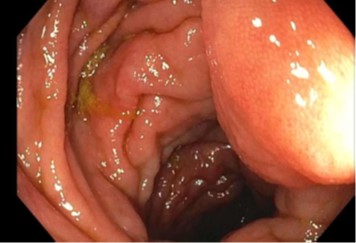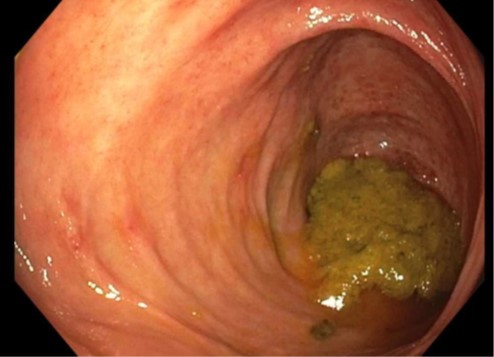Monday Poster Session
Category: Colon
P2589 - Beyond the Airways: Colonoscopic Clues to Systemic EGPA and Cardiac Salvage
Monday, October 27, 2025
10:30 AM - 4:00 PM PDT
Location: Exhibit Hall

Dayna Telken, DO
University of Arizona College of Medicine, Phoenix VA Medical Center
Phoenix, AZ
Presenting Author(s)
Award: ACG Presidential Poster Award
Dayna Telken, DO1, Steven Ma, MD2, Leith Ghani, DO3
1University of Arizona College of Medicine, Phoenix VA Medical Center, Phoenix, AZ; 2University of Arizona College of Medicine, Phoenix, AZ; 3Banner University Medical Center- P, Phoenix, AZ
Introduction: Eosinophilic granulomatosis with polyangiitis (EGPA) is a rare, multi-organ system vasculitis characterized by peripheral eosinophilia, chronic rhinosinusitis with nasal polyps, asthma and peripheral neuropathy. However, seronegative disease (ANCA negative) can include cardiomyopathy and GI manifestations. We report a case of a 53-year-old female hospitalized for cardiogenic shock and offered a heart transplant, which ultimately was cancelled and listed UNOS status 7 due to acute diarrhea. Colonoscopy biopsies demonstrated significant eosinophilia. The patient was ultimately diagnosed with EGPA and heart transplant was deferred.
Case Description/
Methods: A 53-year-old female who had history of allergies, allergic rhinitis, COPD, non-ischemic cardiomyopathy with ejection fraction of 20-25%, was hospitalized for cardiogenic shock. She was offered a heart transplant but was changed to UNOS status 7 due to acute diarrhea. Patient reported a single day of diarrhea with four liquid, brown bowel movements while hospitalized and denied any abdominal pain, nausea, vomiting, fever, chills, hematochezia or melena. Due to acute diarrhea, CT abdomen/pelvis was performed concerning for severe colitis of cecum and ascending colon. GI was consulted and colonoscopy was performed that demonstrated area of significant congested circumferential mucosa with areas of hypopigmentation in ascending colon, and localized area of moderately friable and erythematous mucosa in cecum. Pathology demonstrated colonic mucosa with increased eosinophils with ischemic colitis. Additionally, patient underwent bone marrow biopsy demonstrating hyper eosinophilic syndrome. She was ultimately diagnosed with EGPA and started on IV steroids and cyclophosphamide.
Discussion: EGPA is a rare form of vasculitis that can present with multi-system organ involvement that can include GI symptoms. Our patient had multisystem manifestations but presented with cardiogenic shock. Acute diarrhea while hospitalized prompted inpatient colonoscopy which resulted in colonic eosinophilia. Rheumatology confirmed diagnosis of EGPA and patient treated with IV steroids and cyclophosphamide. Ultimately, patient did not receive a heart transplant to this date. This case highlights the importance of early recognition of GI manifestations in vasculitis diseases such as EGPA and particularly prompt diagnosis can significantly affect patient outcomes, such as a life changing heart transplantation.

Figure: Figure 1. Congested mucosa of ascending colon

Figure: Figure 2. Friable and erythematous cecum
Disclosures:
Dayna Telken indicated no relevant financial relationships.
Steven Ma indicated no relevant financial relationships.
Leith Ghani indicated no relevant financial relationships.
Dayna Telken, DO1, Steven Ma, MD2, Leith Ghani, DO3. P2589 - Beyond the Airways: Colonoscopic Clues to Systemic EGPA and Cardiac Salvage, ACG 2025 Annual Scientific Meeting Abstracts. Phoenix, AZ: American College of Gastroenterology.
Dayna Telken, DO1, Steven Ma, MD2, Leith Ghani, DO3
1University of Arizona College of Medicine, Phoenix VA Medical Center, Phoenix, AZ; 2University of Arizona College of Medicine, Phoenix, AZ; 3Banner University Medical Center- P, Phoenix, AZ
Introduction: Eosinophilic granulomatosis with polyangiitis (EGPA) is a rare, multi-organ system vasculitis characterized by peripheral eosinophilia, chronic rhinosinusitis with nasal polyps, asthma and peripheral neuropathy. However, seronegative disease (ANCA negative) can include cardiomyopathy and GI manifestations. We report a case of a 53-year-old female hospitalized for cardiogenic shock and offered a heart transplant, which ultimately was cancelled and listed UNOS status 7 due to acute diarrhea. Colonoscopy biopsies demonstrated significant eosinophilia. The patient was ultimately diagnosed with EGPA and heart transplant was deferred.
Case Description/
Methods: A 53-year-old female who had history of allergies, allergic rhinitis, COPD, non-ischemic cardiomyopathy with ejection fraction of 20-25%, was hospitalized for cardiogenic shock. She was offered a heart transplant but was changed to UNOS status 7 due to acute diarrhea. Patient reported a single day of diarrhea with four liquid, brown bowel movements while hospitalized and denied any abdominal pain, nausea, vomiting, fever, chills, hematochezia or melena. Due to acute diarrhea, CT abdomen/pelvis was performed concerning for severe colitis of cecum and ascending colon. GI was consulted and colonoscopy was performed that demonstrated area of significant congested circumferential mucosa with areas of hypopigmentation in ascending colon, and localized area of moderately friable and erythematous mucosa in cecum. Pathology demonstrated colonic mucosa with increased eosinophils with ischemic colitis. Additionally, patient underwent bone marrow biopsy demonstrating hyper eosinophilic syndrome. She was ultimately diagnosed with EGPA and started on IV steroids and cyclophosphamide.
Discussion: EGPA is a rare form of vasculitis that can present with multi-system organ involvement that can include GI symptoms. Our patient had multisystem manifestations but presented with cardiogenic shock. Acute diarrhea while hospitalized prompted inpatient colonoscopy which resulted in colonic eosinophilia. Rheumatology confirmed diagnosis of EGPA and patient treated with IV steroids and cyclophosphamide. Ultimately, patient did not receive a heart transplant to this date. This case highlights the importance of early recognition of GI manifestations in vasculitis diseases such as EGPA and particularly prompt diagnosis can significantly affect patient outcomes, such as a life changing heart transplantation.

Figure: Figure 1. Congested mucosa of ascending colon

Figure: Figure 2. Friable and erythematous cecum
Disclosures:
Dayna Telken indicated no relevant financial relationships.
Steven Ma indicated no relevant financial relationships.
Leith Ghani indicated no relevant financial relationships.
Dayna Telken, DO1, Steven Ma, MD2, Leith Ghani, DO3. P2589 - Beyond the Airways: Colonoscopic Clues to Systemic EGPA and Cardiac Salvage, ACG 2025 Annual Scientific Meeting Abstracts. Phoenix, AZ: American College of Gastroenterology.

